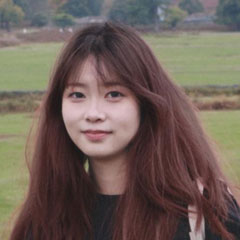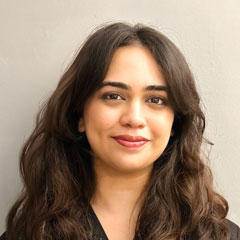Our doctoral researchers
Our doctoral researchers are working on a variety of exciting, cutting-edge topics.
They are exploring a range of contemporary issues including gamification, inclusive digital design and climate apptivism.
Their projects draw on multi-disciplinary perspectives, advance debates and generate new knowledge and understanding of digital communities and inclusion.
Studentship topics
We are delighted to have successfully recruited to the opportunities described below - please review the projects in which our students are engaged.
Political Communities and Gamification: Playing politics and in/exclusion
Eyram Tawia

Student: Eyram Tawia - Doctoral Researcher in Geography and Environment
Schools: Geography and Environment, and Communication and Media
Supervisory team: Professor Sarah Mills (Geography and Environment) and Professor David Deacon (Communication and Media)
Eyram is exploring the relationship between gamification, politics and inclusion.
Gamification, the application of game design elements in non-gaming contexts, is a growing feature of initiatives to engage young people in politics - raising questions about in / exclusion within (digital) political communities - and worthy of scholarly attention.
Sustainable Communities, Inclusive Community Science and Climate Apptivism
Masa Nooh

Student: Masa Nooh - Doctoral Researcher in Communication and Media
Schools: Communication and Media, and Geography and Environment
Supervisory team: Dr Brendan Lawson (Communication and Media) and Dr Tom Stanton (Geography and Environment)
Masa is exploring the requirements, limitations and potential of existing and future environmental smartphone applications.
These apps have great potential to facilitate communities’ engagement with the environment, and can be used to understand and assist behaviour change for more sustainable communities. However, they can run the risk of overlooking inclusion and accessibility. Equity, diversity and inclusion must be front-and-centre of all environmental apps - currently, they are not.
Migrant and Refugee Communities: Digital Resilience and Skills for Citizenship
Odein Princewell

Student: Odein Princewell - Doctoral Researcher in Geography and Environment
Schools: Geography and Environment, and Loughborough Business School
Supervisory team: Dr Sophie Cranston (Geography and Environment) and Dr Michelle Richey (Loughborough Business School)
Odein is examining how migrants and refugees utilise the digital as a tool within their migration trajectories.
How the digital mediates the actual mobility of migrants is relatively well documented. Less attention has been paid to "arrival infrastructures". This project will plug this gap by examining how digital spaces are produced and utilised by and for migrant communities to shape their experiences and outcomes.
Creative Communities, Streaming Platforms and Inclusion: Music, News and Gaming
Rosanna Cant

Student: Rosanna Cant - Doctoral Researcher in Geography and Environment
Schools: Geography and Environment, and Communication and Media
Supervisory team: Dr Allan Watson (Geography and Environment) and Dr Jilly Kay (Communication and Media)
The creative industries have been at the forefront of processes of platformisation for two decades. While fair remuneration has been a prominent issue, platformisation has occasioned a whole host of issues for creative communities more widely.
Rosanna is examining the complex issues around creative communities and inclusion in the digital platform era - for example in music, news or gaming.
Digital Poverty, Exclusion and Deprivation
Doyin Oyerinde

Student: Doyin Oyerinde - Doctoral Researcher in Criminology, Sociology and Social Policy
School: Social Sciences and Humanities
Supervisory team: Dr Adrian Leguina (Criminology, Sociology and Social Policy) and Professor Abigail Davis (Centre for Research in Social Policy)
Doyin is investigating the gender digital divide in Northern Nigeria, focusing on how disparities in technology use and access shape digital inclusion.
Despite the growing importance of digital technologies, women often remain marginalised due to socio-cultural, economic and infrastructure barriers.
By highlighting the ways digital exclusion reinforces broader inequalities, Doyin hopes her research will contribute to more inclusive digital policies and community development strategies.
Inclusive Digital Design in Health: Interfaces and Intersectionality
Aishat Usman-Mamudu

Student: Aishat Usman-Mamudu
School: Design and Creative Arts
Supervisory team: Dr Emilene Zitkus-De-Andrade (Design and Creative Arts) and Dr David Maidment (Sport, Exercise and Health Sciences)
Aishat’s project focuses on digital inclusion in healthcare for older adults living with cognitive decline and comorbidities. Her research explores how inclusive digital design can reduce health inequalities and improve access to digital health services for ageing populations in the UK.
Before beginning her doctoral studies, Aishat worked across several health and community development roles in the UK and Nigeria, including as a Public Health Practitioner, Health Education Officer and Social Prescriber. Her work focused on behaviour change, health promotion and reducing health disparities among vulnerable populations.
ESRC Funded - Digital Gaming / Gambling Harms and Students: Financial Literacy and the Transition to Adulthood
Amy Linklater

Student: Amy Linklater
School: Social Sciences and Humanities
Supervisory team: Professor Sarah Mills and Professor Sarah Holloway (Geography and Environment, Loughborough University), Professor Peter Kraftl (Geography, Earth and Environmental Sciences, University of Birmingham) and Dr Janine Maddison (YGAM)
Amy’s research is exploring a growing challenge within our digital society – how young people navigate the increasingly blurred boundaries between digital gaming and digital gambling.
Her project focuses on gambling-style mechanisms such as loot boxes and pay-to-spin features which replicate many of the structural and psychological elements of gambling – including variable rewards, real-money transactions and chance-based outcomes.
Concentrating on the experiences of older teenagers and HE students, she will explore how they understand and engage with these gambling-like mechanisms in digital games, how they develop (or lack) the financial and digital literacy to navigate them, and the financial and social impacts these activities can have in their everyday lives.
Working in collaboration with the Young Gamers and Gamblers Education Trust (YGAM), Amy aims to generate insights that will directly inform and support YGAM’s University and Student Engagement Programme.
ESRC Funded - Overcoming Obstacles: exploring barriers and facilitators for British Sign Language (BSL) users in accessing essential services
Maryna Hura
Student: Maryna Hura
School: Sport, Exercise and Health Sciences
Supervisory Team: Dr David Maidment (Sport, Exercise and Health Sciences), Professor Daniel Rhind (Sport, Exercise and Health Sciences) and Dr Maria Goodwin (Aston University)
Collaborative partner: Action Deafness
BSL users can face social exclusion as a direct result of linguistic exclusion - negatively impacting their employment, education and access to essential services such as healthcare and banking.
Maryna will investigate the challenges and enablers experienced by BSL users when accessing essential services. She will explore systemic barriers, communication difficulties and service accessibility while identifying potential facilitators such as assistive technologies, policy interventions and staff training.
Mediated Lives, Mobile Selves: Media Practices, Identity, and Community among Chinese Digital Nomads in Chiang Mai
Li Zhang

Student: Li Zhang
Schools: Communication and Media, and Geography and Environment
Supervisory Team: Dr Jessica Robles (Communication and Media) Dr Sophie Cranston (Geography and Environment)
Li is exploring the media practices, identity and community among digital nomads, focus on their mobility and digital platforms.
For digital nomads, digital media platforms are not merely communication tools but constitute the very "habitat" in which they live, work, and build community.
By analysing this unique community, Li aims to challenge traditional migration theories and propose a new, media-centric paradigm of mobility, revealing how patterns of identity, belonging and community are being reshaped in the digital age.
Algorithmic Visibility, Cultural Production and Digital Inclusion: A grounded exploration of Pakistan’s unconventional creators
Aisha Zia Khan

Student: Aisha Zia Khan
School: Social Sciences and Humanities
Supervisory team: Dr Allan Watson (Geography and Environment) and Dr Jilly Kay (Communication and Media)
Aisha is exploring how digital creators in Pakistan - who are often marginalised by geography, ethnicity, gender or class - use digital platforms to challenge algorithmic exclusion, negotiate visibility and reimagine what inclusion and cultural participation mean within unequal platform economies.
She hopes that her research will contribute to understanding and supporting more equitable digital economies by informing broader discussions of digital inclusion, platform design and the experiences of creators in non-Western contexts.